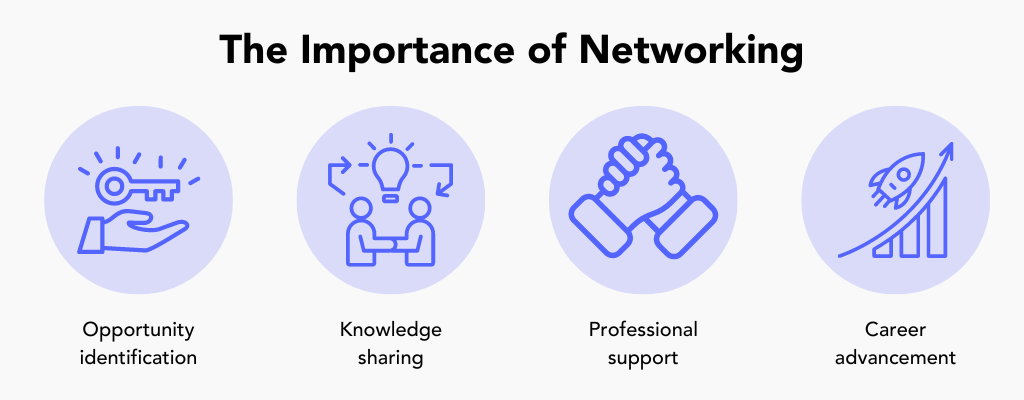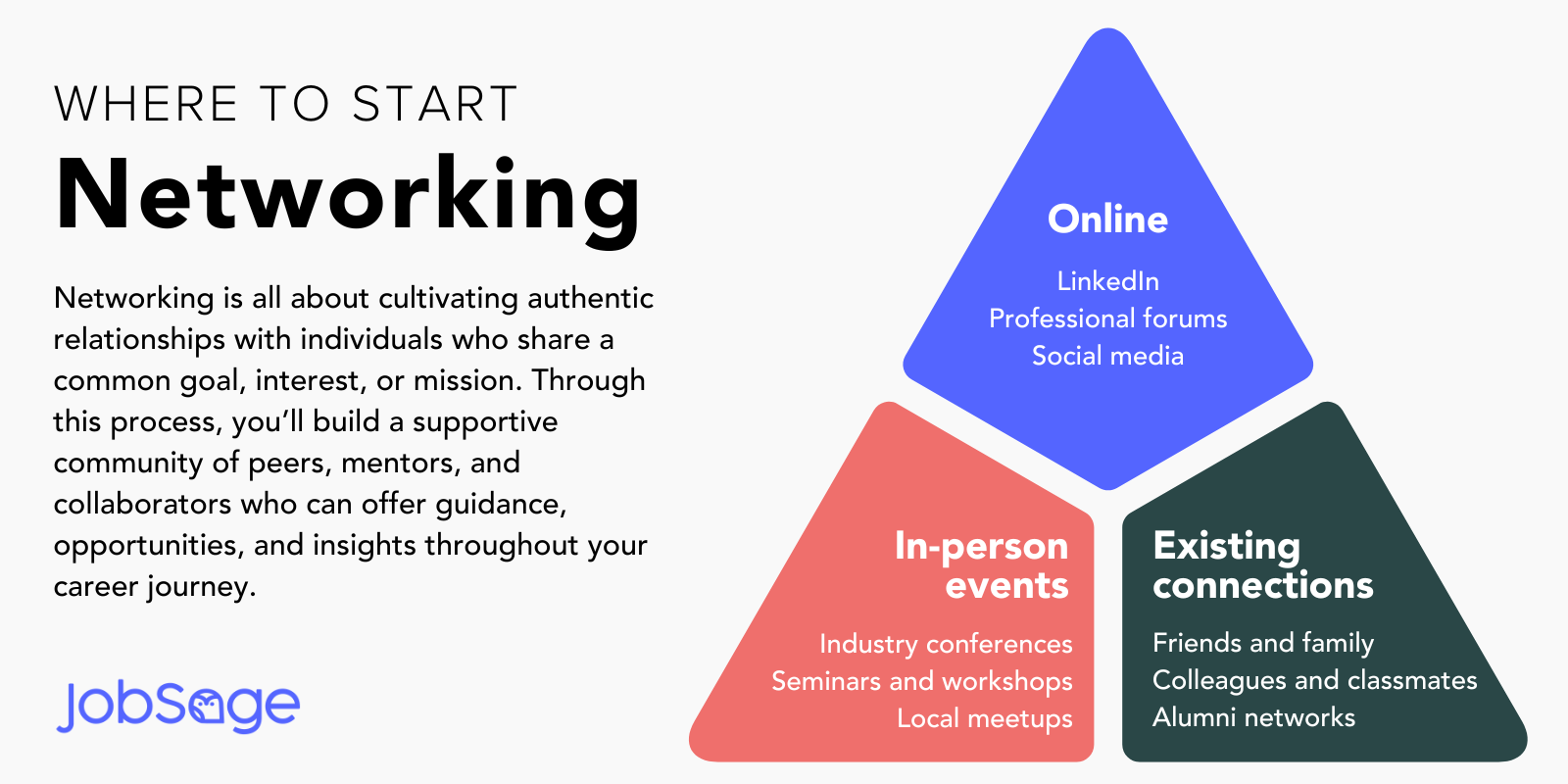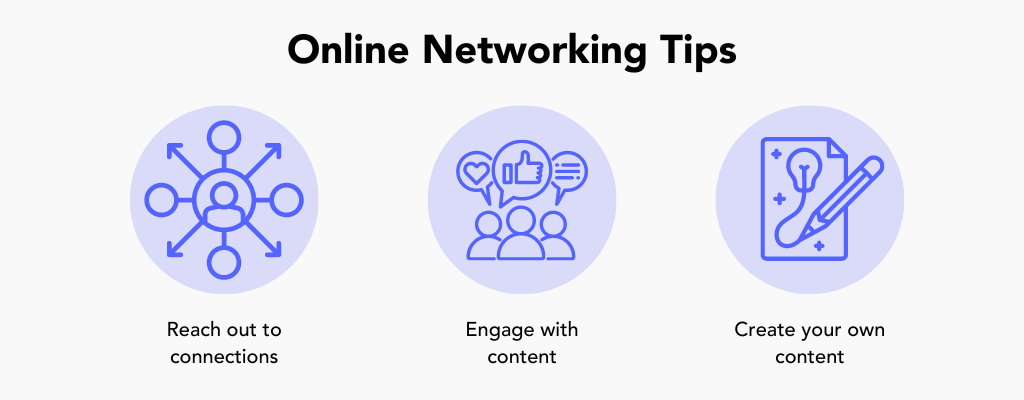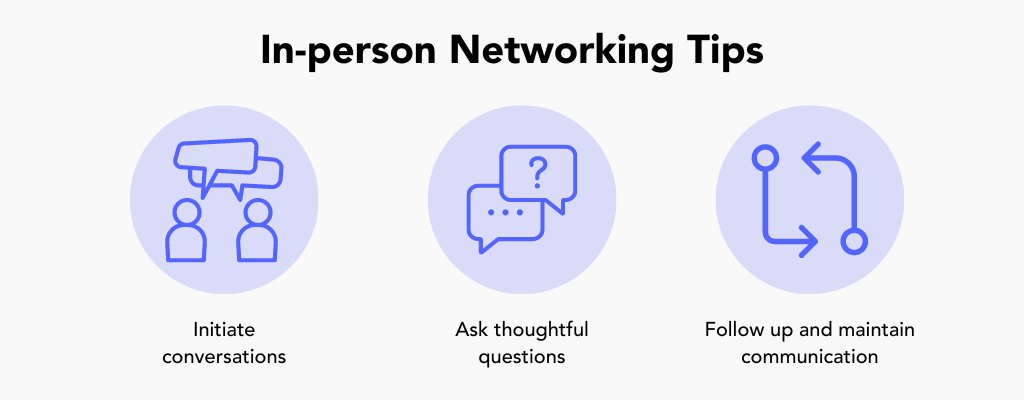Navigating the world of professional networking can feel like stepping into a maze without a map. If you’ve ever felt daunted by the idea of networking, you’re not alone. Many of us have been there, unsure of where to begin or how to make meaningful connections.
But here’s the thing: while networking might seem intimidating at first, it’s an invaluable tool for career growth and personal development.
Whether you’re a recent graduate, a mid-career professional, or someone looking to switch industries, building a solid network can open doors to new opportunities, insights, and collaborations.
In this guide, we’ll break down the basics of networking that you need to know to get started, including:
Let’s dive in!
Why is networking important?
Networking is more than just exchanging business cards at events or connecting with professionals on LinkedIn.
Networking is about cultivating authentic relationships with individuals who share common interests or goals. It’s about building a supportive community of peers, mentors, and collaborators who can offer guidance, opportunities, and insights throughout your career journey.

1. Opportunity identification
Networking exposes you to new ideas, trends, and opportunities within your industry. Connecting with professionals from diverse backgrounds gives you access to job openings, partnerships, and projects you might not have discovered otherwise.
2. Knowledge sharing
Networking allows you to learn from others’ experiences and expertise. Whether seeking advice from mentors or engaging in discussions with peers, networking provides valuable insights and perspectives that can help you grow personally and professionally.
3. Professional support
Building a solid network provides a support system during challenging times in your career. Whether you’re navigating a career transition, facing a professional setback, or seeking feedback on a new idea, your network can offer encouragement, advice, and resources to help you overcome obstacles.
4. Career advancement
Opportunities for career advancement often arise through referrals and recommendations from within your network. By cultivating strong relationships with colleagues and industry influencers, you increase your visibility and credibility, making you a desirable candidate for promotions, collaborations, and leadership roles.

Where to start networking
There’s no one right way to go about networking— and you certainly don’t have to set out tackling all methods.
Instead, choose one or two (at least to start) you are comfortable with, and start building your presence there.
Online networking platforms
In today’s digital age, online networking platforms have become invaluable tools for expanding your professional network. Here are some key platforms to consider:
- LinkedIn: With over one billion members worldwide, LinkedIn allows you to connect with professionals in your industry, join relevant groups, and showcase your skills and expertise through your profile.
- Professional forums: Online forums and communities specific to your industry or areas of interest can be excellent places to network with like-minded individuals, share insights, and seek advice.
- Social media: Platforms like Twitter, Facebook, and Instagram aren’t just for personal use! They can also be powerful tools for networking, especially within niche communities or through targeted hashtags.
Networking online offers convenience and accessibility, allowing individuals to connect with professionals worldwide without the constraints of geographical location or time zones. As an added bonus, online networking also makes it easy to prepare before engaging with contacts.
However, online networking lacks the personal touch and spontaneity of face-to-face interactions, sometimes leading to less meaningful connections. Moreover, the digital environment may also present challenges in establishing trust and credibility.
Offline networking events
While online networking has its advantages, don’t underestimate the value of face-to-face interactions at offline networking events.
Great places to meet people in person include:
- Industry conferences: Conferences offer opportunities to connect with professionals from various organizations, learn about the latest trends and innovations in your field, and engage in meaningful discussions during networking sessions.
- Seminars and workshops: These smaller-scale events often provide a more intimate setting for networking, allowing you to interact more closely with speakers, participants, and industry leaders.
- Local meetups: Look for networking events, meetups, or professional gatherings in your area. These informal gatherings can be great for building connections with professionals in your local community.
Networking in person offers deeper, more authentic connections, facilitated by direct communication and interpersonal rapport. Face-to-face interactions allow for better reading of social cues and nuances, fostering trust and relationship building.
The downside to in-person networking is that you may be limited by location, time constraints, and the need for physical presence, making it less convenient.
Leveraging existing connections
Networking isn’t always about meeting new people. Don’t overlook the networking opportunities within your current circle of contacts.
Consider reaching out to:
- Friends and family: Your connections may have valuable insights or connections within your industry that you can leverage for networking.
- Colleagues and former classmates: Current and former colleagues and classmates from university or professional courses can be valuable networking contacts. Reach out to them to reconnect and explore potential collaborations or opportunities.
- Alumni networks: Many universities and educational institutions have alumni networks that offer networking events, mentorship programs, and online communities for graduates to connect and support each other in their careers.
Leveraging existing connections for networking offers the advantage of familiarity and established rapport, making it easier to initiate conversations and seek support or advice. Existing connections may also be more receptive to networking requests, as trust and mutual understanding are already in place.
However, relying solely on existing connections for networking may limit exposure to new perspectives, industries, and opportunities. While your existing contacts can be a great place to start, it’s essential to balance nurturing existing relationships and actively seeking out new connections to ensure a diverse and dynamic network that supports long-term career growth and development.
How to get started networking
Once you narrow down where you want to start your networking journey, it’s time to think about the how.

Online strategies
Here are some effective strategies for approaching and engaging with contacts online:
Tip #1: Reach out!
Don’t hesitate to initiate conversations with professionals you admire or whose work aligns with your interests. Send personalized messages introducing yourself, expressing genuine admiration for their work, and suggesting ways you could potentially collaborate or exchange insights.
Tip #2: Engage with content.
Actively engage with content your connections share on LinkedIn, Twitter, or professional forums. Like, comment, and share their posts to show your support and contribute to meaningful discussions. This helps to keep you on their radar and fosters a sense of reciprocity.
Tip #3: Creating your own content
Establish yourself as a thought leader in your field by creating and sharing valuable content. Write articles, share insights from your experiences, or offer tips and advice related to your expertise. This showcases your knowledge and expertise and attracts like-minded professionals to connect with you.

In-person strategies
While online networking is valuable, face-to-face interactions still hold immense importance in building genuine connections. Here are some strategies for approaching and engaging with contacts in person:
Tip #1: Initiate conversations.
Break the ice by introducing yourself to people you meet at networking events, conferences, or seminars. Be approachable, confident, and friendly, and don’t be afraid to start conversations with strangers.
Tip #2: Ask thoughtful questions.
Show genuine interest in others by asking open-ended questions that encourage meaningful dialogue. Listen actively to their responses and seek opportunities to relate to their experiences or offer insights of your own.
Tip #3: Follow up and maintain communication.
After engaging in conversation with someone, be sure to follow up afterward. Send a personalized email or LinkedIn message expressing your pleasure at meeting them and suggesting ways to stay in touch or collaborate further. This helps to solidify the connection and lays the groundwork for future interactions.
Build your network and your career
Unlock career growth by understanding how to start networking. By setting clear goals, embracing authenticity, and leveraging both online and offline opportunities, individuals can forge meaningful connections, access new opportunities, and cultivate a supportive community that propels them forward in their professional journey.
Whether you’re just starting or looking to expand your existing network, remember that every connection made is an opportunity and friendship waiting to be explored. Embrace the journey, stay true to yourself, and watch as your network— and your career— flourishes.
